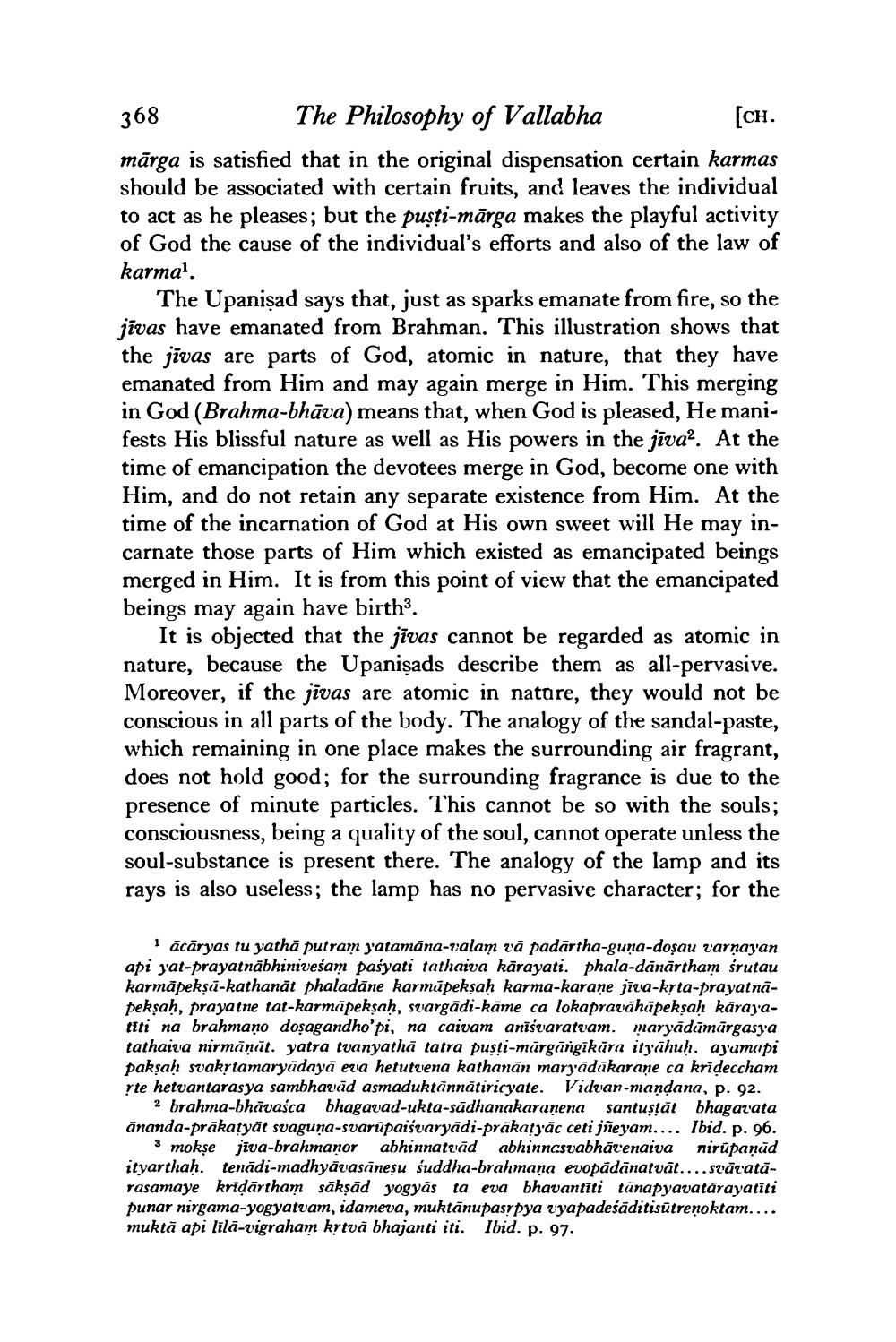________________
368
The Philosophy of Vallabha
[CH. mārga is satisfied that in the original dispensation certain karmas should be associated with certain fruits, and leaves the individual to act as he pleases; but the pusți-mărga makes the playful activity of God the cause of the individual's efforts and also of the law of karmal.
The Upanişad says that, just as sparks emanate from fire, so the jīvas have emanated from Brahman. This illustration shows that the jīvas are parts of God, atomic in nature, that they have emanated from Him and may again merge in Him. This merging in God (Brahma-bhāva) means that, when God is pleased, He manifests His blissful nature as well as His powers in the jīva?. At the time of emancipation the devotees merge in God, become one with Him, and do not retain any separate existence from Him. At the time of the incarnation of God at His own sweet will He may incarnate those parts of Him which existed as emancipated beings merged in Him. It is from this point of view that the emancipated beings may again have birth?.
It is objected that the jīvas cannot be regarded as atomic in nature, because the Upanişads describe them as all-pervasive. Moreover, if the jīvas are atomic in natare, they would not be conscious in all parts of the body. The analogy of the sandal-paste, which remaining in one place makes the surrounding air fragrant, does not hold good; for the surrounding fragrance is due to the presence of minute particles. This cannot be so with the souls; consciousness, being a quality of the soul, cannot operate unless the soul-substance is present there. The analogy of the lamp and its rays is also useless; the lamp has no pervasive character; for the
1 ācāryas tu yathā putram yatamāna-valam vā padārtha-guna-doşau varnayan api y'at-prayatnābhinivesam paśyati tathaiva kārayati. phala-danartham srutau karmāpekṣū-kathanāt phaladāne karmūpekşah karma-karane jīva-krta-prayatnapekşah, prayatne tat-karmūpekṣaḥ, suargādi-kāme ca lokapravāhūpekşah kārajatiti na brahmano dosagandho'pi, na caivam anīśvaratvam. maryādāmārgasya tathaiva nirmāņāt. yatra tuanyathā tatra puști-mārgāngīkūra ityāhuḥ. ayumapi pakşah svakrtamaryādayā eva hetutvena kathanān mary'ādākarane ca krideccham yte hetvantarasya sambhavād asmaduktannātiricyate. Vidvan-mandana, p. 92.
2 brahma-bhāvasca bhagavad-ukta-sādhanakaranena santuştāt bhagavata ānanda-prākatyāt svaguna-svarūpaiśvaryādi-prākatyāc ceti jneyam.... Ibid. p. 96.
3 mokse jīva-brahmanor abhinnatvād abhinnasvabhāvenaiva nirüpanud ityarthah. tenādi-madhyāvasanesu śuddha-brahmana evopādānatvāt....svāratarasamaye kridārtham sākṣād yogyās ta eva bhavantīti tunapyavatārayatīti punar nirgama-yogyatvam, idameva, muktānupasypya vyapadeśāditisütrenoktam.... muktā api līlā-vigraham krtva bhajanti iti. Ibid. p. 97.




